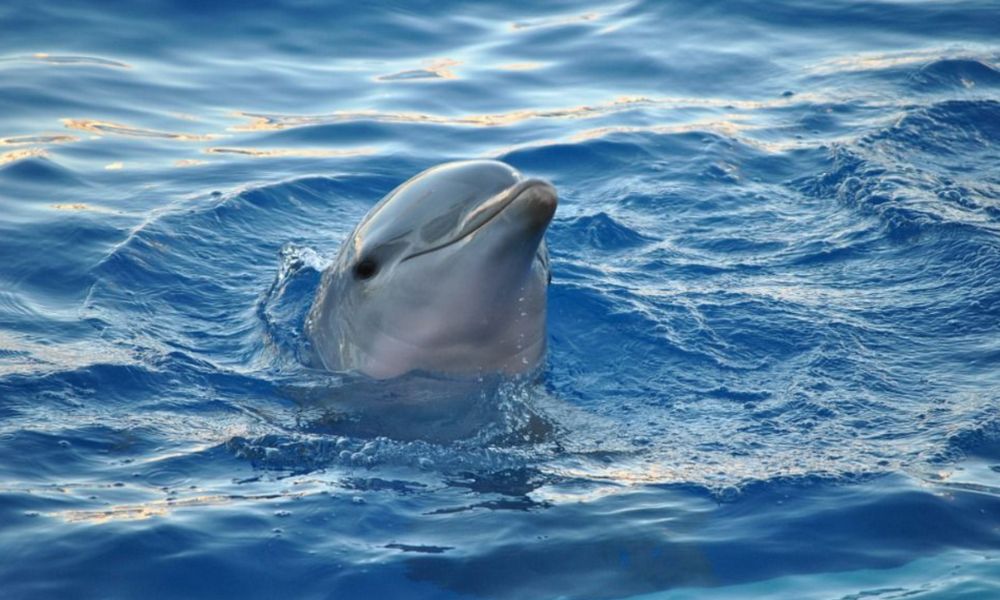Summer is finally in full swing, and beaches may be beckoning to you for some much needed relaxation and sunshine!
But the oceans provide much more than soothing sounds and sights for people. They provide up to half the world’s oxygen and also absorb about a quarter of humanity’s yearly carbon emissions — and they deserve to be protected, for all species.
Similarly, marine critters have inherent value and important roles in their ecosystems completely independent of any awe or fascination we may have with them. They deserve to live in their natural environments for their natural life spans.
Unfortunately, many of our actions while around the water can cause unintended harm for turtles, dolphins, whales, corals, and other marine life who already are facing serious threats from human-caused noise pollution, ship strikes, discarded fishing gear, climate change, and more. Thankfully, we can easily take steps to minimize our harm.
Whether you’re planning a longer vacation or absconding for a weekend getaway, please take a few extra moments to check that your choices won’t be harming the planet’s oceans and the incredible plants and animals who inhabit them.
And if you can’t get away this year, or don’t live near an ocean, sea, or beach — don’t worry. We’re including some action steps you can still take to help, wherever you are.
R-E-S-P-E-C-T
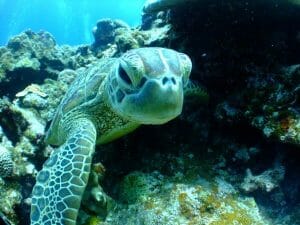
Representative Image (Hiroaki Horiguchi/Pixabay)
- Avoid interactions that exploit animals: Contrary to popular perception, featured interactions like swimming with dolphins and sea turtles or watching orcas perform in shows aren’t harmless. Any company or business that removes animals from their wild homes and confines them for people’s entertainment and easy viewing — and that includes aquariums and dolphinariums — likely don’t have the animals’ best interests in mind. Similarly, any featured opportunities that allow you to pay to play with or touch marine animals isn’t one you should attend — even if the organization is claiming the exploitation is a form of “conservation.” If you’re in doubt, it’s always good to focus on what you can “give” to the animals, rather than what you can “get” from them. The reality is that a sea turtle likely would much prefer a clean beach to lay her eggs than getting up close and personal with you.
- Observe marine dwellers from a distance: If you spot a marine animal, don’t go up and take a selfie with him or her — doing so can have devastating effects, including habituating the animal to humans, which can reduce their chances of surviving in the wild or even lead to their death, as happened tragically with Freya the walrus. If you find creatures in a tidepool, please look — but don’t touch — them. Do not feed marine life — besides being illegal, it’s unhealthy for them. Please also honor any posted notices regarding keeping companion animals off coastal areas with nesting birds, sea lions, or other sensitive marine animals. And if you do choose an experience that lets you observe animals in their natural environment — including snorkeling or whale watching — don’t touch any animals you see and make sure you’re aware of your equipment at all times. A finger or flipper on a delicate coral can be fatal for these sensitive animals in particular. The National Oceanic and Atmospheric Administration (NOAA) notes that any marine viewing should be limited to not longer than a half hour to minimize stress to animals — particularly given that if you’re part of a commercial expedition, you’re likely not the only humans those animals will be exposed to on any given day.
- Say ‘No’ to marine dweller “souvenirs” and “pets”: The Reef World Foundation estimates that approximately 1.5 million live stony corals and 4 million pounds of coral skeletons are taken every year from the oceans to be sold as souvenirs to tourists. The Foundation and National Geographic also report millions of invertebrates, including starfish, and vertebrates — including sea horses and pufferfish — are taken from their wild homes and sold as “pets” or left to die and bleach in the sun to be sold in tourist shops. Leave any shells or skeletons you may find on the shelves, and if you happen to find one on the beach, let it break down and return nutrients back to the ecosystem.
Watch What You Wear
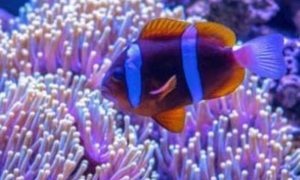
Representative Image (David Clode/Unsplash)
- Check your sunscreen: Avoid sunscreens with harsh chemicals — including oxybenzone and octinoxate — that are deadly and damaging to corals, fish, sea urchins, shrimp, and more! Instead, opt for reef-safe sun protection (and make sure it’s from vegan and cruelty-free brands like these!) You can also wear Ultraviolet Protection Factor (UPF) sunwear, including sunglasses and long-sleeved shirts or pants or seek shade during the hottest parts of the day.
- Avoid ocean-harming cosmetics: Many cosmetics include ingredients derived from sea dwellers, including squalene (also referred to as squalane), which most often comes from sharks. There are many great vegan, cruelty-free options out there, including from companies like O-Way, Kinder Beauty, and Shared Planet.
- Avoid “fast fashion”: The mass production of cheap clothes, known as “fast fashion,” is wreaking havoc on the environment. Opt for clothes from thrift stores, yard sales, or clothing swaps to decrease your impact.
Educate and Equip Yourself To Help
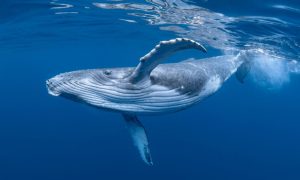
Representative Image (Craig Lambert Photo/Adobe Stock)
- Learn more about specific marine dwellers: From seals and sea lions to birds and whales, this cool toolkit from Be Whale Wise explores different marine species and proper etiquette for being around them safely.
- Watch for whales — entangled whales, that is: If you love whales and want to see them up close, why not learn how to help them if they end up stranded on the shore? The Large Whale Entanglement Response Network has a tiered training system — the first level is free here!
- Read about marine animal captivity: To learn more about why wild marine animal captivity is so cruel to these animals, we recommend that you check out the Animal Welfare Institute’s resource list here.
Help When — And Where — You Can
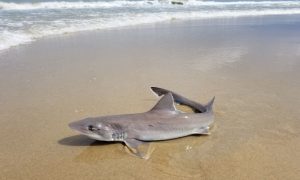
Stranded Dogfish Shark (K.A./Adobe Stock)
- Volunteer at a cleanup: If you live near a beach, bay, river, stream, lake, or any other body of water, getting involved with organized cleanups — or starting your own — is an excellent way to make an immediate impact for marine animals. Otherwise, if you’re traveling to a beachy area, why not check to see if there’s going to be a cleanup underway while you’re there — or even better, why not coordinate your vacation around such a great opportunity to help animals? You can search for upcoming cleanups near you using Ocean Conservancy’s interactive map here.
- Help with a habitat restoration project: Habitat restoration projects around coastal areas are an excellent way to improve water quality and help wildlife! It’s worth the time to check out what conservation-focused nonprofits operate in your area, let them know your interests and your traveling capacity, and see what opportunities they may have for you! National and state parks, fish and wildlife departments, and departments of natural resources also often have volunteer opportunities. You can try searching for keywords like “environmental stewardship opportunities” or “habitat restoration projects” near you.
- Report stranded, sick, or injured animals: If you spot a marine animal who appears stranded, sick, or injured, it’s important to immediately report the animal to authorities and follow their instructions, rather than trying to approach the animal without any knowledge of what to do. Saving Ocean Wildlife has a Whale Alert app you can download to immediately report distressed whales, while Be Whale Wise has a reporting form for discoveries of distressed marine animals in Washington and Canada. You can find the stranding network closest to you — on both coasts — via this resource from NOAA. Also check your area to see if any organizations exist that will help clean up improperly discarded or lost fishing gear, like this one serving the Salish Sea.
- Eat more plants: A great way to make sure you’re not contributing to overfishing, illegal fishing, and bycatch marine casualties is to fill your plate with plants! There are many delicious, affordable, and accessible vegan options out there.
- Speak up to local legislators and businesses about marine welfare: Support legislation that restores or limits development on coastal habitats, aims to reduce or eliminate human hazards such as by establishing boating speed limits, or bans the removal of marine animals from their wild homes for “education” or “entertainment.” You can also write to any local businesses with captive marine animals — most typically aquariums — and urge them to stop capturing wild animals for display in confinement.
Reduce Your Waste
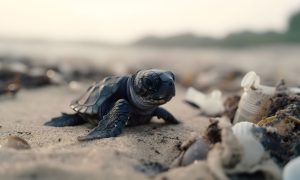
Representative Image (Patrick/Adobe Stock)
- Avoid single-use plastics: Opt out of single-use plastic take-out utensils and straws but also single-use coffee cups, which are often coated with low-density polyethylene, which can release trillions of microplastic particles that are bad for the oceans and bad for human health. You can also bypass plastic waste by investing in a reusable water bottle and taking reusable take-out containers with you when you go.
- Conserve energy: Turn lights off when you leave a room, layer up in winter rather than cranking up the heat, and try to walk, bike, carpool, or use public transportation as much as possible rather than driving or flying.
Prevent Hazards From Entering Waterways
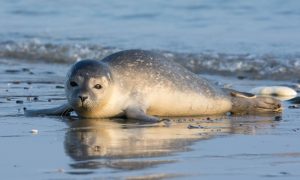
Representative Image (Iwona/Adobe Stock)
- Properly dispose of medications: Make sure to drop off any excess medications at a “take back” program or pharmacy, rather than flushing them or throwing them away with the rest of your trash.
- Practice compassionate gardening: If you keep a garden, you can help marine life and pollinators by companion planting or using other alternatives to harsh pesticides and chemicals.
- Keep toxins out of stormwater runoff: Don’t let fertilizers or other chemicals end up in storm drains. Building a rain garden with native plants is an excellent and fun way to help, too!
- Nix chemical detergents: Choose eco-friendly laundry detergents that don’t rely on chemicals to clean your clothes.
You can learn more about other products you may use that are causing harm to animals here!

